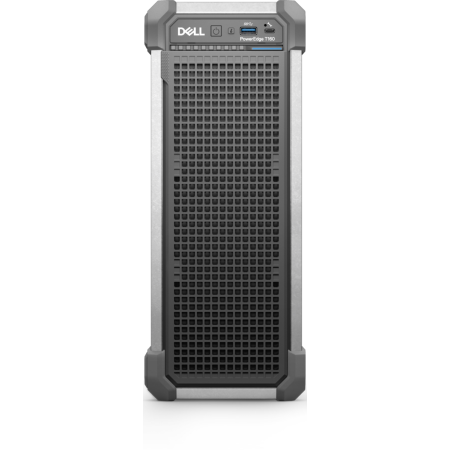Dell PowerEdge T160 Tower Server - Options Available
Call for Pricing
This product requires a custom quote. Contact us for pricing and availability.
Request a Quote 020 3488 4346Key Features
- Maintenance - Filter bezels shield components from dust and grease
- Features - Server-class capabilities with optimal price-performance
- Sustainable
- Build - Constructed from recycled materials with reduced chemical usage
- Configuration - Multiple upgrade paths for growing business needs
- Operation - Enhanced thermal management for reliable performance
PowerEdge T160 Tower Server Overview
The Dell PowerEdge T160 is a compact, office-friendly tower server that delivers enterprise-level features at an optimal price point. With its quiet acoustic performance and easy-to-manage design, the T160 is ideal for small businesses and remote offices requiring reliable server capabilities without the complexity of larger systems.
Office-Optimized Design
The T160 features a compact chassis specifically engineered for office environments where noise and space are considerations. The quiet operation ensures it won't disrupt your workspace, while easy-to-manage filter bezels protect internal components from dust and grease, extending component lifespan and reducing maintenance requirements.
Sustainable Construction
Built with environmental responsibility in mind, the T160 utilizes recycled materials in its construction and features unpainted steel components to reduce chemical usage during manufacturing. This sustainable approach doesn't compromise on durability or performance.
Enterprise Features at SMB Pricing
Despite its entry-level positioning, the T160 delivers genuine enterprise-class server features:
- ECC Memory Support - Error-correcting memory for data integrity
- RAID Configurations - Software and hardware RAID options for data protection
- Remote Management - iDRAC capabilities for out-of-band administration
- Flexible Expansion - Multiple upgrade paths as your business grows
- Energy Efficiency - 80 Plus certified power supplies reduce operating costs
Performance & Scalability
The T160 supports Intel Xeon E processors and Pentium processors for budget-conscious deployments, providing the right balance of performance and affordability. Memory support varies by processor choice, with configurations supporting sufficient RAM for typical small business workloads including file sharing, print services, and basic database operations.
Build-to-Order Configurations
Basic File & Print Server
- Processor Intel Pentium G6400 (2-core, 4.0GHz)
- Memory 8GB DDR4 2666MHz
- Storage 2 x 1TB SATA HDD (RAID 1)
- RAID Software RAID S140
- Network Dual 1GbE onboard
- Management iDRAC9 Basic
Small Business Server
- Processor Intel Xeon E-2224 (4-core, 3.4GHz)
- Memory 32GB DDR4 2666MHz ECC
- Storage 2 x 500GB SSD + 2 x 2TB HDD
- RAID PERC H330 Hardware RAID
- Network Dual 1GbE onboard
- Management iDRAC9 Express
Remote Office Infrastructure
- Processor Intel Xeon E-2288G (8-core, 3.7GHz)
- Memory 64GB DDR4 2666MHz ECC
- Storage 4 x 1TB SSD (RAID 10)
- RAID PERC H730P (2GB cache)
- Network Dual 1GbE + 10GbE option
- Management iDRAC9 Enterprise
Storage Flexibility
Configure your T160 with multiple drive options including SATA HDDs for cost-effective capacity and SSDs for performance-critical workloads. RAID controller options range from basic software RAID to hardware RAID solutions with cache for enhanced performance.
Management & Support
The T160 includes iDRAC9 (Integrated Dell Remote Access Controller) with options from Basic to Enterprise licensing. This allows remote server management including power control, system health monitoring, and operating system deployment—particularly valuable for remote office deployments.
Ideal Workloads
- File and print services for small offices
- Email servers (Microsoft Exchange, etc.)
- Point of sale (POS) backend systems
- Basic web hosting and content management
- Branch office infrastructure
- Backup and archive servers
- Small database servers (up to 20 users)
- Office productivity applications
Why Choose the T160?
The PowerEdge T160 represents the perfect balance of enterprise reliability and small business affordability. Its quiet operation, easy maintenance, and sustainable construction make it ideal for office environments, while genuine server-class components ensure reliability for business-critical operations. With flexible upgrade paths, the T160 grows with your business.
| Server Type | Tower |
|---|---|
| CPU Sockets | 1 |
| Processor | Intel Xeon |

